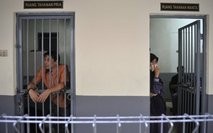Indonesian jails often act as incubators of terrorism and fail to stamp out violent jihadist beliefs, a study said Thursday, warning of a growing threat from "freelance terrorists".
The findings of "Jihadists in Jail", a year-long research project by the Australian Strategic Policy Institute, is based on unprecedented interviews with 33 men convicted on terrorism charges by Indonesian courts.
They were spoken to in four prisons in Jakarta, Solo, Surabaya and Semarang and the study included former senior members of the Jemaah Islamiyah terror network and others associated with groups such as KOMPAK and Ring Banten.

The report's author, former Australian government intelligence analyst Dr Carl Ungerer, told national broadcaster ABC a group of hardcore jihadis were preparing to leave Indonesian jails over the next 18 months.
Some of them said they would bomb Western targets on their release.
"Several of the men we interviewed hold this view. One of them said to us directly that if he was released from prison today, he would bomb the US embassy tomorrow," he said.
Over the last decade, around 600 people have been arrested on terrorism charges in Indonesia, the report said. Many have been set free and not re-offended, but others have.
"Recidivism remains a genuine concern," said the report, adding that it was questionable whether Jakarta has learned any lessons from holding dangerous extremists.
"Not only is the further radicalisation of terrorist convicts in prison an issue, but the potential radicalisation of the inmate population and the prison officers is a problem as well," it said.
The report pointed to terror convicts frequently being placed in the same prison block and being allowed to mingle freely.
"This has helped expand their personal networks with the militant circle," it said.
"The men said they had the opportunity to meet individuals whom they wouldn't have otherwise met because of the small cell structures and the high level of secrecy surrounding their activities.
"These interactions allowed many of them to better understand their specific roles in the organisation and the broader structure of terrorist organisations."
In Cipinang prison in Jakarta, interviewees said convicted terrorists ganged up to form "shadow governments" to run the jails, with their reputations as fearless fighters gaining them respect.
"They use the time (in jail) to reflect on their past activities in order to find ways to better perform their jihad duties," it said.
A key concern was the use of prison mosques, which it said were places jihadists used to preach their gospel and attract new members.
Ungerer added that the men questioned said they no longer needed the backing of a large terror organisation like the now defunct Jemaah Islamiyah, which orchestrated the Bali bombing in 2002 that killed more than 200 people.
A growing number now call themselves freelance terrorists, willing to try smaller, more random attacks.
"We're no longer dealing with organisations or organisational hubs, we're dealing with individuals, some call them lone wolves, some call them freelancers," said Ungerer, who has researched Indonesian Islamic terrorism for nearly a decade.
"It means that the threat is not going away, if anything, it's getting worse," he told ABC.
The Institute is an independent, non-partisan organisation that was established by Canberra to "inform the public on strategic and defence issues".
























